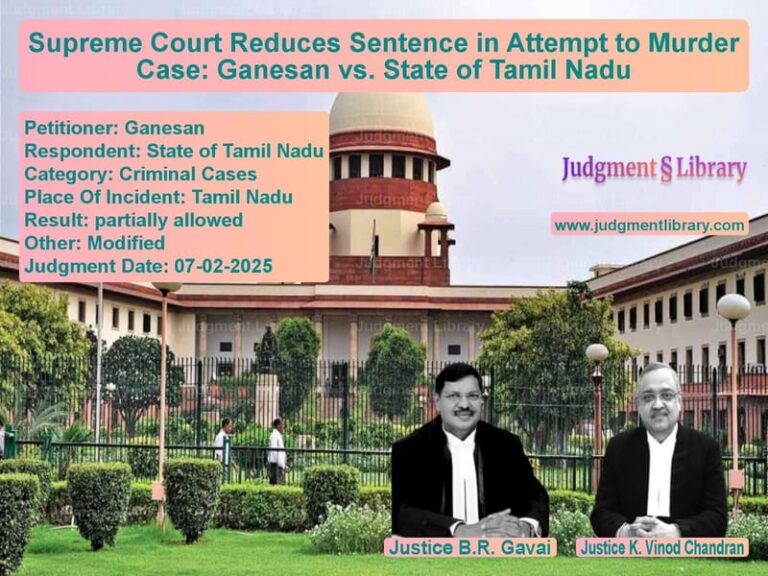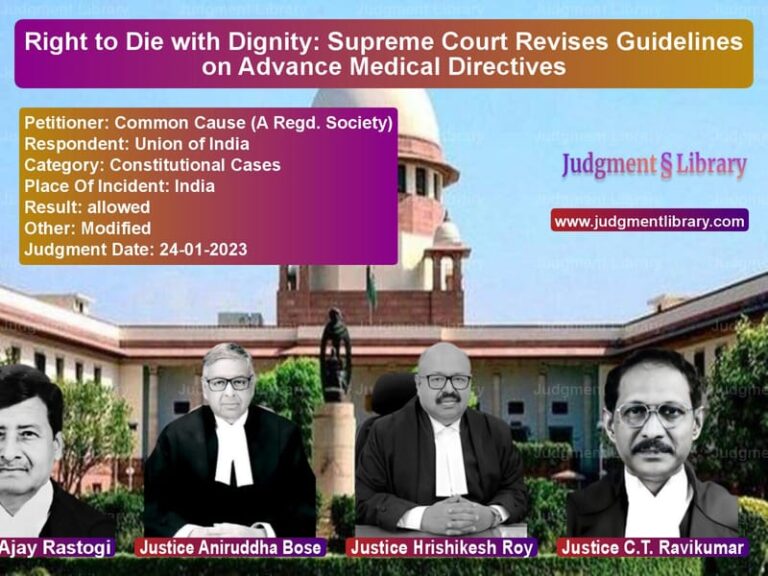TATA Motors vs. BEST: Supreme Court Rules on Tender Dispute for Mumbai Electric Buses
The Supreme Court of India, in the case of TATA Motors Limited vs. The Brihan Mumbai Electric Supply & Transport Undertaking (BEST), delivered a significant judgment on a public contract dispute regarding the tender process for supplying 1,400 single-decker AC electric buses in Mumbai. The dispute revolved around whether BEST had fairly evaluated bids and whether the winning bidder, EVEY Trans Pvt. Ltd. (EVEY), was given an unfair advantage. The Court ultimately ruled in favor of BEST and EVEY, upholding the tender process and dismissing TATA Motors’ challenge.
Background of the Case
BEST floated a tender on February 26, 2022, inviting bids for the supply, operation, and maintenance of 1,400 (+50% variation) electric buses in Mumbai for 12 years. The tender required the buses to run 200 km on a single charge under ‘actual conditions’ with an 80% state of charge (SoC). Eight companies, including TATA Motors and EVEY, participated in the bidding process.
During the evaluation process, BEST found that TATA Motors’ bid failed to meet the required criteria as it had proposed that its buses would achieve 200 km per charge only in ‘standard test conditions’ rather than actual road conditions. Consequently, TATA Motors was disqualified. EVEY, the lowest bidder (L1), was awarded the contract.
TATA Motors challenged its disqualification before the Bombay High Court, arguing that the tender process was unfair and that EVEY had been allowed to alter its bid post-submission. The High Court dismissed TATA Motors’ petition but also ruled that BEST’s acceptance of EVEY’s bid was flawed, directing BEST to restart the tender process. Aggrieved by this, all three parties—TATA Motors, EVEY, and BEST—approached the Supreme Court.
Legal Issues Considered
The Supreme Court examined the following key legal issues:
- Whether BEST had the right to disqualify TATA Motors for offering buses that met the range requirement under standard test conditions rather than actual conditions.
- Whether EVEY was improperly allowed to revise its bid post-submission, thereby violating tender rules.
- Whether the High Court erred in directing BEST to cancel the tender and initiate a fresh process.
- Whether judicial intervention was warranted in a commercial tender process.
Arguments by TATA Motors
TATA Motors contended that:
- The requirement for buses to achieve 200 km per charge in ‘actual conditions’ was ambiguous.
- Its bid met the technical requirement as per AIS 040 (standard test conditions), which is a globally accepted standard.
- BEST arbitrarily rejected its bid without allowing clarifications or negotiations.
- EVEY was given preferential treatment by being allowed to modify Annexure Y, an undertaking confirming compliance with the technical specifications, after bid submission.
- The High Court was correct in ruling that EVEY’s bid acceptance was flawed and required BEST to reissue the tender.
Arguments by BEST
BEST defended its decision, stating that:
- The tender explicitly required buses to meet the 200 km range requirement in ‘actual conditions’ and not in standard test conditions.
- TATA Motors’ bid was the only one that failed to meet this requirement and was therefore rightly disqualified.
- The claim that EVEY was improperly allowed to revise its bid was incorrect since Annexure Y was required only for the successful bidder and was not a decisive factor in bid qualification.
- Canceling the tender and restarting the process would result in financial losses and delays, adversely impacting public transport in Mumbai.
Arguments by EVEY
EVEY argued that:
- The revision of Annexure Y was a clerical correction and did not amount to a material change in its bid.
- Its buses fully met the technical requirements of the tender, unlike TATA Motors’ bid, which deviated from the essential criteria.
- The High Court wrongly equated its minor correction with TATA Motors’ major deviation from the tender requirements.
- Since the contract was already in execution, canceling the tender at this stage would disrupt public transport operations.
Supreme Court’s Observations
Disqualification of TATA Motors
The Supreme Court ruled that BEST had the right to specify the operating range requirement in actual road conditions. Since TATA Motors’ bid explicitly stated that it met the 200 km requirement under standard test conditions rather than actual conditions, the disqualification was justified.
Evaluation of EVEY’s Bid
The Court found that while EVEY had submitted a revised Annexure Y after the bid deadline, this did not constitute an unfair advantage since Annexure Y was not a decisive criterion for bid qualification. The Court held that BEST had not acted arbitrarily in accepting EVEY’s bid.
Judicial Intervention in Commercial Contracts
The Supreme Court reiterated that courts should exercise restraint in interfering with tender processes unless there is clear evidence of arbitrariness, bias, or mala fide intent. The Court emphasized that commercial contracts involve technical considerations best left to experts.
Final Judgment
The Supreme Court ruled as follows:
- The appeal by TATA Motors was dismissed, upholding its disqualification from the tender.
- The appeal by EVEY was allowed, confirming the validity of the contract awarded to it.
- The High Court’s direction to restart the tender process was set aside.
- BEST’s decision to award the contract to EVEY was upheld.
- Ongoing operations under the contract were permitted to continue without disruption.
Key Takeaways
- Strict Compliance with Tender Conditions: Bidders must strictly adhere to tender specifications, and deviations—even minor—can lead to disqualification.
- Judicial Restraint in Tender Disputes: Courts should not intervene in commercial tenders unless there is evidence of serious irregularities.
- Public Interest Considerations: Canceling tenders midway can result in significant financial losses and service disruptions.
- Technical vs. Procedural Compliance: While material deviations can result in disqualification, minor clerical errors may not invalidate a bid.
Conclusion
The Supreme Court’s ruling in TATA Motors vs. BEST reinforces the principles of fairness and transparency in public procurement while ensuring that tender processes are not unduly disrupted. By upholding the technical disqualification of TATA Motors and confirming the contract awarded to EVEY, the Court has clarified the legal framework governing tender disputes in India’s public transport sector.
Petitioner Name: TATA Motors Limited.Respondent Name: The Brihan Mumbai Electric Supply & Transport Undertaking (BEST).Judgment By: Justice Dhananjaya Y. Chandrachud, Justice Pamidighantam Sri Narasimha, Justice J. B. Pardiwala.Place Of Incident: Mumbai.Judgment Date: 19-05-2023.
Don’t miss out on the full details! Download the complete judgment in PDF format below and gain valuable insights instantly!
Download Judgment: tata-motors-limited-vs-the-brihan-mumbai-el-supreme-court-of-india-judgment-dated-19-05-2023.pdf
Directly Download Judgment: Directly download this Judgment
See all petitions in Company Law
See all petitions in unfair trade practices
See all petitions in Corporate Compliance
See all petitions in Mergers and Acquisitions
See all petitions in Judgment by Dhananjaya Y Chandrachud
See all petitions in Judgment by P.S. Narasimha
See all petitions in Judgment by J.B. Pardiwala
See all petitions in dismissed
See all petitions in supreme court of India judgments May 2023
See all petitions in 2023 judgments
See all posts in Corporate and Commercial Cases Category
See all allowed petitions in Corporate and Commercial Cases Category
See all Dismissed petitions in Corporate and Commercial Cases Category
See all partially allowed petitions in Corporate and Commercial Cases Category







